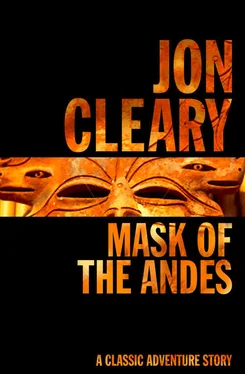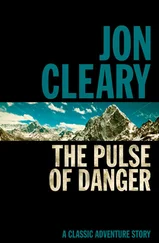Jon Cleary - Mask of the Andes
Здесь есть возможность читать онлайн «Jon Cleary - Mask of the Andes» — ознакомительный отрывок электронной книги совершенно бесплатно, а после прочтения отрывка купить полную версию. В некоторых случаях можно слушать аудио, скачать через торрент в формате fb2 и присутствует краткое содержание. Жанр: unrecognised, на английском языке. Описание произведения, (предисловие) а так же отзывы посетителей доступны на портале библиотеки ЛибКат.
- Название:Mask of the Andes
- Автор:
- Жанр:
- Год:неизвестен
- ISBN:нет данных
- Рейтинг книги:5 / 5. Голосов: 1
-
Избранное:Добавить в избранное
- Отзывы:
-
Ваша оценка:
- 100
- 1
- 2
- 3
- 4
- 5
Mask of the Andes: краткое содержание, описание и аннотация
Предлагаем к чтению аннотацию, описание, краткое содержание или предисловие (зависит от того, что написал сам автор книги «Mask of the Andes»). Если вы не нашли необходимую информацию о книге — напишите в комментариях, мы постараемся отыскать её.
Mask of the Andes — читать онлайн ознакомительный отрывок
Ниже представлен текст книги, разбитый по страницам. Система сохранения места последней прочитанной страницы, позволяет с удобством читать онлайн бесплатно книгу «Mask of the Andes», без необходимости каждый раз заново искать на чём Вы остановились. Поставьте закладку, и сможете в любой момент перейти на страницу, на которой закончили чтение.
Интервал:
Закладка:
He shook his head, half-angrily, as he thought of her. She would have gone to bed last night with her usual prayers for himself and his sister Carmel: the prayers for him thanking God that he was a priest, those for Carmel asking Him to drive the devil out of her. Nell McKenna broadcast her prayers as if they were gossip; the Lord, if He didn’t hear them direct, must always pick them up somewhere along the grapevine. Nell would be rising in a few hours, her lips pursed with piety even before she had put in her expensive dentures, the first thing she did every morning. It was her belief that no lady was ever seen without her teeth, not even by her husband or her children; with the slackening of standards, hats and gloves were no longer de rigueur for ladies, but teeth were another matter. She would dress as carefully as for a Papal audience and go to the church in Beverly Hills where she took daily communion. Later in the day she might drive downtown to Los Angeles and have coffee with the cardinal, the two of them sitting there discussing a Church from which McKenna, the adored son, the one the Lord had blessed her with, felt he was fast slipping away.
Agostino had already gone up to the mission with as many fish as he could carry. They had gone out just before dawn, when the lake had still been silver under the last light of the moon, and the catch this morning had been bigger than usual. The lake abounded in fish and the villagers of Altea saw that no strangers came to fish it dry; even the citizens of San Sebastian had been warned off. During the revolution of 1952 the campesinos had all been given rifles and they had never returned them; some of the old revolutionaries from San Sebastian, grown fat and bourgeois now, did not appreciate the irony of looking down the barrels of guns they had handed out in the cause of freedom. But that was what they had met when they had come up here to try some fishing, and finally the message had been recognized: the lake fishing was only for the villagers of Altea. It had been McKenna’s first sign of acceptance, limited though it was, when he had been allowed to join Agostino’s father, Jesu Mamani, in one of the totora boats and throw out a line. When he had had a boat of his own shipped up from Antofagasta, a fibreglass skiff to which he had fitted a small outboard motor, one or two rifles had been brought out again; but Jesu Mamani, after some deliberation, had ordered them put away. McKenna was allowed to fish so long as he kept the catch only for himself. Fish and potatoes were the villagers’ only cash crops and they wanted no competition from outsiders.
As McKenna straightened up with the last of the fish catch, four large salmon, he felt another gust of wind, much stronger than the first. At the same time there was another dull boom, as a second stick of dynamite was exploded. Instinctively he looked out towards the lake, squinting against the wind’s force. He saw Jesu Mamani, standing up in his boat, sway, then bend over to clutch at the boat’s side. The tiny craft rocked, then tilted as the water seemed to rise under it. Mamani went over the side without a cry, almost as if his plunge were intentional; the boat took in water, tilted further, then turned over and sank. The two fishermen in the other two boats swung round and McKenna waited for them to row towards the drowning Mamani; but each of them sat stockstill, staring across the choppy water at the floundering man, but making no attempt to save him. In another minute or so McKenna knew Jesu Mamani would be beyond saving.
He dropped the fish, leapt at the skiff’s rope and wrenched it from the mooring post. He caught a glimpse of Agostino, now half-way back down the slope from the mission, and he yelled at him to run. But the boy had stopped, stood absolutely motionless, staring with the same frozen look as that of the two fishermen at his drowning father. As McKenna scrambled into the skiff he yelled again at Agostino, but already he knew there would be no help from that quarter. Or from anywhere.
The motor barked into life at once. On full throttle McKenna bounced the skiff over the uneven water; he had no more than fifty yards to travel but it seemed ten times that distance. Mamani had disappeared beneath the surface, but his head and flailing arms suddenly broke into view again as McKenna skidded the skiff to a halt among the dead fish that had floated up from the sunken boat. McKenna cut the motor, jumped to the front of the skiff and reached out to the hand that clutched desperately at his. As he felt the frenzied fingers tear at his hand, McKenna also felt the cold that was already killing the man: the hand that clutched his was like a jagged piece of ice. Mamani’s eyes were wild and white in a face that was now almost black; his mouth was wide open, but there was no air left in him for any sound. Frantically McKenna pulled the man towards him; the skiff tilted and for one awful moment he thought he was going to join the Indian in the freezing water. He flung himself backwards, still hauling on Mamani’s arm; he could feel his chest heave and tighten as both the thin air and fear caught at him. Oh God, help me! His eyes seemed to be bursting from their sockets as he struggled to pull Mamani from the water; then through his fractured stare he saw the Indian’s other hand take hold of the side of the skiff. McKenna lay back praying for strength that he knew wouldn’t be his own, that he would have to borrow from faith. He reached behind him, wrapped his arm round the cross-seat, gave one last agonizing tug that seemed to burst his chest, and fell back into the bottom of the skiff as the cold, sodden bundle of Mamani tumbled in on him.
McKenna lay gasping, every breath like a gulped mouthful of powdered glass. He could feel something warm on his upper lip and knew his nose was bleeding, something that hadn’t happened to him for a long time, not since he had become accustomed to the 13,000 feet altitude here on the altiplano. His head was splitting apart and his eyes were almost blind. But, though only half-conscious, he still knew whose was the desperate plight. Somehow or other he managed to roll out from under the unconscious Mamani. He struggled up on to his knees, feeling the iron vice that wrapped his chest, and crawled to the back of the skiff. Still unable to see properly, he fumbled for the starter of the motor. He made three grabs at it before he found it; beyond praying, cursing now, he jerked it savagely, half-expecting the motor just to cough and die on him. The motor did cough, then it sent the skiff shooting towards the shore.
It went past the two Indians in their totora boats, its wash rocking them dangerously. They stared at McKenna, but he did not look at them. He drove the skiff straight on into the shore, cutting the motor a fraction too late so that they hit the rocky beach with a thump hard enough to send him sprawling forward on to the still inert Mamani.
He picked himself up, dimly aware that he had scraped his knees and knuckles. He was still having difficulty getting his breath and his head felt as if it had been cleft by an axe, but he had got back some of his strength and he could once more see clearly. He stumbled over the side of the skiff, feeling the icy water bite at his ankles as he stepped into it, and hitched the rope round the mooring post. As he turned back, wondering if he would have the strength to lift Mamani out of the boat, a voice said in English, ‘I’ll give you a hand.’
He looked up at the stranger who had appeared out of nowhere. He had an impression of a tall thin man in a checked tweed cap and a bright red quilted jacket, but there was no time to take further stock of the newcomer. McKenna clambered back into the skiff, grabbed at Mamani’s wet clothes that felt as if they were already turning to ice under the now constant wind, and heaved the Indian into a sitting position. As he pushed Mamani towards the outstretched arms of the stranger he said, ‘I’m glad you’re here.’
Читать дальшеИнтервал:
Закладка:
Похожие книги на «Mask of the Andes»
Представляем Вашему вниманию похожие книги на «Mask of the Andes» списком для выбора. Мы отобрали схожую по названию и смыслу литературу в надежде предоставить читателям больше вариантов отыскать новые, интересные, ещё непрочитанные произведения.
Обсуждение, отзывы о книге «Mask of the Andes» и просто собственные мнения читателей. Оставьте ваши комментарии, напишите, что Вы думаете о произведении, его смысле или главных героях. Укажите что конкретно понравилось, а что нет, и почему Вы так считаете.












